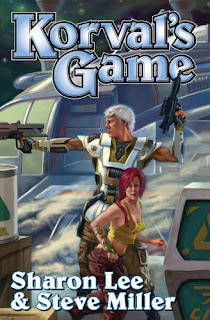Ace Double Reviews, 47:
Cradle of the Sun, by Brian M. Stableford/
The Wizards of Senchuria, by Kenneth Bulmer (#12140, 1969, $0.75)
This review was first written in 2004. I'm reposting it today, on the occasion of Brian M. Stableford's 70th birthday.
A modest entry in the Ace Double series, pairing a very early Stableford novel -- in fact, his first novel -- with an ordinary piece from Bulmer's long career.
Cradle of the Sun is about 48,000 words,
The Wizards of Senchuria about 40,000. This is in some ways a perfect example of what the Ace Double format could allow: introducing a new writer to the SF audience with a somewhat unusual novel, but making the package more palatable to the nervous buyer by also including a routine, unsurprising but known quantity in the form of a veteran contributor's rather unambitious offering.
 |
| (Covers by Jack Gaughan and Kelly Freas) |
Stableford was born in 1948, and his first story, a collaboration with Craig Mackintosh called "Beyond Time's Aegis", as by "Brian Craig", appeared when he was only 17, in the November 1965 issue of
Science Fantasy. He has also written as Kay Stirling, John Rose, and Francis Amery, though the Stirling and Rose pseudonyms may have only been in fanzines. (The "Brian Craig" pseudonym was later used for some gaming tie-ins and at least one more collaboration with Mackintosh. The Amery pseudonym was used for a brief series of stories in
Interzone a few years ago.) He first attracted attention (though not very much, I suppose) with two series for DAW in the early 70s: the
Hooded Swan books about a spaceship pilot named Grainger who is host to an alien mind-creature; and the
Daedalus books, about an ecological mission to a variety of troubled colony planets. Stableford published quite a few books, mostly for DAW, until the early 80s. He reappeared in the late 80s with a highly-praised group of books about an Alternate Historical Victorian England with werewolves. Throughout the 90s his reputation has only grown, with an impressive list of rather hard SF stories mostly on biological themes, many linked as part of his "Emortality" future, which culminated in 6 novels, the last being last year's
The Omega Expedition.
I am very impressed by Stableford's most recent work, which I think among the best biologically-oriented SF -- thoughtful, original, extrapolatively exciting. A few years ago I made a point of reading the
Hooded Swan and
Daedalus books, which are solid if minor work: rather cynical, often focussing on interesting biological ideas (especially in the
Daedalus books), certainly worth a look, but not as good as his mature stuff.
The above couple paragraphs were written in the early 2000s. Since then Stableford has continued to publish prolifically, often with the small press Wildside, and he as also translated a great many 19th Century French novels of the fantastic.
Cradle of the Sun is pretty ambitious, imaginative, and in many ways characteristic of Stableford's later work. (Though it's certainly not as strange (nor as ambitious) as his later Ace Double T
he Blind Worm.) It's set in the far future, when Man is dying out: after an era of exploration, humankind collectively seems to have lost will and ambition. The rats have in the interim evolved to full intelligence, still living in some dependency on humans. A rat philosopher and a human Librarian meet and talk, and they come to the conclusion that both peoples will soon die out, victims of some sort of "psychoparasite". The only solution is a mission to the island of Tierra Diablo, suspected base of this parasite, and only a combined rat/human mission will possibly succeed.
Thus 6 people, 3 rats and 3 humans, set out for Tierra Diablo. The leader is Kavan Lochlain, said to be that last human who feels fear. He reacts to fear but confronting it -- thus he is a good choice to venture into scary territory. There is also the sense that his fear is one of the positive emotions humans have been robbed of by the psychoparasite. He is accompanied by a beautiful aquatically adapted woman and a tiger man (humans have bioengineered themselves in many ways), and by the philosopher rat Anselmas and two more. Kavan carries a bomb which will destroy whatever they find.
Their journey takes them through some intriguing territory, and they meet some strange people -- flyers, and snake people, and so on. At the same time an invasion by mechanical hive-minded insect creatures destroys the Library and the nearby fastness of the rats. Eventually the group reaches the sea and battles their way across, encountering further hive minded creatures, flyers this time, before getting to Tierra Diablo. Inevitably they suffer great losses, until Kavan finally faces his greatest fears and discovers the creature behind the psychoparasite. The eventual revelation of this creature's nature and motives is a bit of a letdown, I will say. Still, the story is a decent read. There's plenty of adventure, some neat SFnal creatures, and an OK resolution. Kavan is a dour, anti-romantic, hero, of at least some interest, though for the most part he and the other main characters are types and not well-rounded people. Obviously Stableford has done much better -- did much better almost right away -- but this is not a first novel to be ashamed of.
Kenneth Bulmer (actual first name Henry) is an English writer, who retired in about 1988, and died in 2005. He wrote in the neighborhood of 100 novels, including the "Dray Prescot" series for DAW under the name "Alan Burt Akers". He also contributed 15 Ace Double halves. And he was the editor for the last 9 volumes of the English original anthology series
New Writings in SF. I've found what little of his work I've read to be modestly enjoyable adventure fiction, perhaps a bit slapdash in construction -- I suppose entirely typical of what one would expect from a writer of such prolificity.
The Wizards of Senchuria turns out to be from the middle of an 8 book long series, which the ISFDB collectively calls "Keys to the Dimensions". I will admit I did not suspect that it was part of a series until the end, where one villain remains unvanquished. Knowing that it is part of a series explains some problems I had with the book -- basically, the rapid introduction to an overarching "war" of sorts, which main conflict is quickly abandoned, and only touched on towards the end, never resolved. That problem aside, the book stands alone tolerably, in that it does tell a central story that is finished in this novel. [I later read a couple further books in this series, and those reviews have been posted here as well.]
Scobie Redfern is looking for dinner in Manhattan when he steps into a cab with a big man who seems in a hurry. Soon they are being chased by mysterious beings, and Scobie finds himself snatched away -- as he soon learns, to another dimension, a parallel world. The big man and his friends seem to be the good guys in a war between the dimensions, the foe being the evil Contessa. But before long Scobie is captured and enslaved by the Contessa, only to join a group from yet another parallel world, who plan to escape with the help of one of their own, a beautiful girl named Val who turns out to be a Porteur. Porteurs have the ability to find and open gates between the dimensions, and Val does so, and soon the ragged remnants of their party have struggled through a world or two and seem to have found safety.
The lovely world they find is called Senchuria, but it contains much danger, too. First there are the crystals that radiate paralyzing hate. Then they are captured and cured -- even rejuvenated. But somehow all the men and women are feeling lust for each other -- in Scobie's case, lust for Val. He senses that this is unnatural and tries to resist, soon realizing that the Senchurians -- the Wizards of Senchuria -- feed on emotions, hate, love, anger, fear -- using them somehow to help resist yet ANOTHER inimical force fighting between the dimensions. For, you see, the Senchurians are actually good guys ...
And so it goes, Scobie and Val being recruited to help the Senchurians (after putting up noble resistance), going to yet another dimension, briefly encountering the Contessa, ... Oh yes, and finally falling in love with each other for real. The ending is abrupt, and as I mentioned leaves a major thread, the war with the Contessa, dangling completely. But I'm sure Bulmer gets to that in later books (the last, a 1983 DAW novel, is called The Diamond Contessa, after all). In sum, a bit of a mess of a novel, not very tightly structured at all, not very logical, but mildly amusing light fun.















